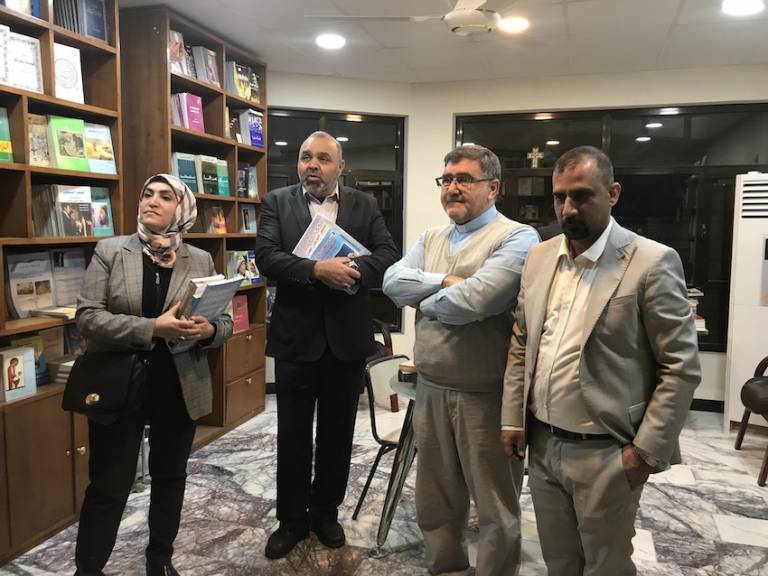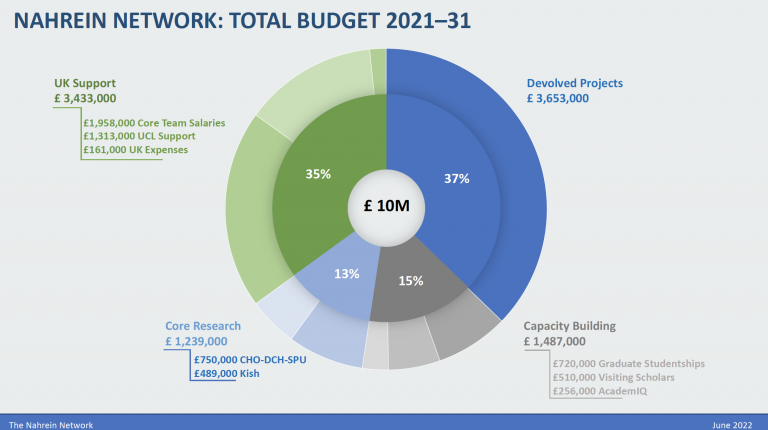Thanks to generous philanthropic funding, the Nahrein Network can continue its mission until 2031. Read about this phase of work, which began in October 2021.

The Nahrein Network works with Iraqi stakeholders including cultural workers and activists, researchers, state authorities and other parts of Iraqi society to aid the country's post-conflict recovery. The Plural Heritage of Baghdad project, led by Dr Zainab Al-Waeli at Al-Mustansiriyah University, works with local religious groups to protect and preserve minority heritage.
Huge new threats to Iraq’s future have emerged in past few years, while the old ones have not gone away. The economy is still heavily dependent on oil. Post-Da’esh reconstruction has been frustratingly slow. Iraq's political system is as fragile as ever, while poverty, gender inequalities, and youth unemployment remain endemic. Meanwhile, damming, oil extraction, and global climate heating are destroying the environment. There has never been a greater need for big, bold responses to these intractable challenges.
The Nahrein Network continues to extend its work with Iraqi academics and cultural heritage professionals to tackle these problems. Working with well-established partnerships and creating new ones, we support research and policy on:
- an integrated approach to natural and cultural heritage;
- youth-focused solutions, both within and outside the state;
- reparative approaches to the past, inspired by the work of UCL History’s Centre for Study of the Legacies of British Slave-Ownership.
We retain the same basic operating principles and practices, and build on the considerable successes of our AHRC-GCRF-funded work since 2017. Two-thirds of the budget is committed to supporting Iraqi-led research in Iraq and the UK. The rest covers UK staff and support costs.

What We Do
Supporting Iraqi colleagues' research
Research Grants Scheme and Mini-Grants Scheme. Twice a year, we offer a range of grants to support Iraqi-led research on the ways in which heritage, history and the humanities can improve life in Iraq.
Visiting Scholarships. Once a year, we offer a visiting scholarship scheme to bring Iraqi heritage professionals and academics to the UK for two-month placements.
Graduate Studentship. In 2020–23 we offered a small number of MA+PhD studentships, covering the full costs of graduate study in a history or heritage related subject at UCL.
Research Workshops. Building on the success of our British Academy funded Iraq Publishing Workshops in 2019, we offer a multi-year programme, AcademIQ, designed to support Iraqi researchers in the arts, humanities and social sciences with academic skills development.
Research Networks. We support the development of disciplinary research networks in Iraq, including the highly successful Kurdish Cultural Heritage Network.
Furthering our own research
Our strong team remains together, continuing our own individual research programmes:
Dr Rozhen Mohammed-Amin, lecturer and researcher at the Kurdistan Institution for Strategic Studies & Scientific Research (KISSR) and co-founder and president of the Cultural Heritage Organization (CHO), continues her team's groundbreaking research on the roles of digital technologies in enhancing the emotional impact of heritage.
Dr Mehiyar Kathem, Senior Research Associate at University College London, conducts research and policy consultancy on the politics of heritage, statebuilding and peace-building in Iraq.
Dr Paul Collins, Keeper of the Middle East Department at the British Museum, carries out research and practice in decolonising museums' use of Iraqi heritage, as exemplified in his recent exhibition, Owning the Past.
Professor Eleanor Robson, Professor of Ancient Middle Eastern History at UCL, collaborates with The Open Richly Annotated Cuneiform Corpus and UCL's Research Software Development Group to develop Arabic-language tools for online, open-access publication, research and education on the cuneiform cultures of ancient Iraq and its neighbours.
Governance and Administration
The Network runs day-to-day from the History Department at UCL. This is where the Director Professor Eleanor Robson, Deputy Director Dr Mehiyar Kathem, Administrator Mrs Oana Borlea-Stancioi, and Communications and Social Media Officer Mrs Zainab Mahdi are based.
The Network also has two Co-Directors. Dr Paul Collins works at the British Museum, while Dr Rozhen Mohammed-Amin is at the Kurdistan Institution for Strategic Studies & Scientific Research.
The Network's Management Committee meets every three months. The committee includes representatives from the Network’s main partners in Iraq, and UK-based academics in the field. Members of the Management Committee review applications for research grants and provide advice to the core team. Visiting Scholarship applications are assessed by a panel including representatives from its partners.
We are hugely grateful to the private donor whose vision and generosity allows us to continue this vital work. The gift has been thoroughly vetted by UCL and the Network's activities are serviced as if they were sponsored research. We remain completely committed to working ethically, transparently and fairly.
 Close
Close

